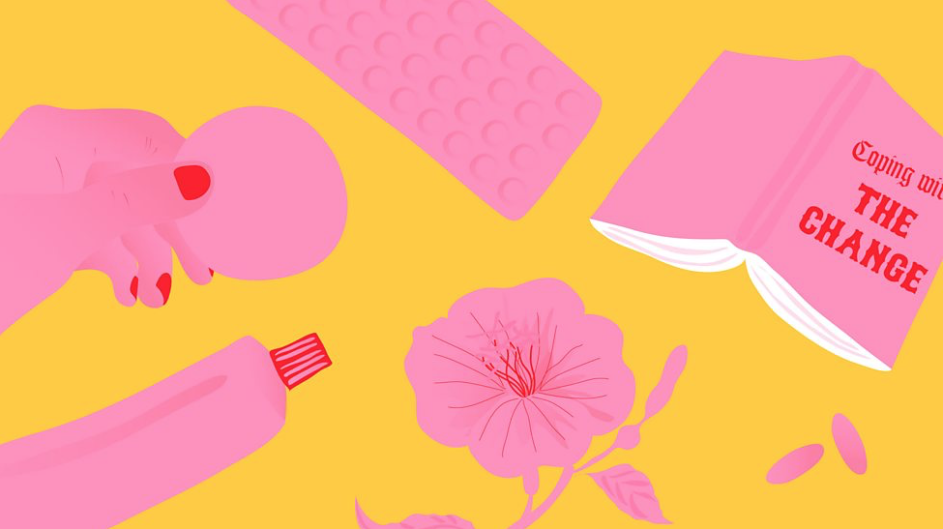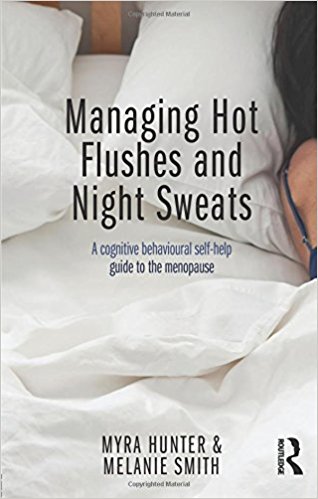Around five years ago – roughly around the same time I started my business, I started feeling anxious. Not just a little bit stressed and uptight, but super anxious, anxious, in a panic attack way, that made me feel like I was going insane and was slowly losing grip on reality.
I was also waking up on average of six or seven times a night with intense, bed drenching night sweats. Luckily I was my own boss so could manage my time so that I could lie in bed a little longer in the morning, or go home if I felt an anxiety attack coming on. But I shared my situation with very few people, as I didn’t like the fact I wasn’t coping and couldn’t understand what was happening to me.
After a discussion with my doctor and some hormone tests, I was relieved to find out it was peri menopausal. It helped to know what it was – but apart from HRT the doctor could offer me no help. I carried on as normal – or as normal as I could be on 4 hours sleep – and approached the menopause as I had with periods, pregnancy and ongoing bouts of insomnia.
If I’d had a normal job, where I had to be on time every day, attend meetings and manage a team, I would have found it almost impossible, as some days I could barely function and would have burst into tears had anyone been even slightly mean to me.
Would I have told my co-workers what was wrong and been honest if I needed a day of, if I’d been an employee – probably not. As I am from a generation that cracks on and is determined to prove we are only having a period/pregnant therefore not ill and as capable as men of getting the job done. Mentioning ‘female problems’ is/was taboo – unless you wanted to get out of games at school – despite the fact you could be writhing in agony with pain, or homicidal with hormones.
Myra Hunter, emeritus professor of clinical health psychology at King’s College recently published one the first major studies to look at how symptoms such as hot flushes affect women at work, tracking 124 female employees in the public and private sectors. They found that symptoms could have a significant impact, but that following a simple programme of CBT, using a self-help booklet, the level of symptoms could be reduced to a manageable level.
Hunter told the Guardian that menopausal symptoms remained a “taboo issue” in many workplaces and, while policies to support pregnant women are now standard, there is still little awareness of the impact that the menopause can have on women who are often at the peak of their career.
“Often there’s a will to address this among managers, but they just don’t know how to talk about it,” said Hunter. “Women want it to be raised if appropriate. They don’t want to be treated as ill, they just want some understanding and awareness of it.”
As discussions become more public and the media start to raise awareness of the symptoms of menopause, things can only get better. But are these subjects of interest to anyone apart from those going through it? When sharing the fact your breasts are leaking milk/you’re having a painful period/hot flush are not met with horrified looks in the work place, we might get somewhere, but we have to be willing to put it out there. With some women not even willing to admit their age in public and undergoing all sorts of procedure to halt the ageing process – just how ready are we to start speaking out about menopause?
Luckily my symptoms are easing, or perhaps I have just learnt to live with them, and I’m not sure about the idea of CBT (would you offer ‘mind over matter’ therapy to someone with flu?) but I’m willing to give it a try.
Myra Hunter has written a book called Manage Hot Flushes and Night Sweats: A cognitive behavioural self guide to menopause, which you can buy here.
Also check out last weeks Womens Hour which covered the menopause in detail.







This is a such a BIG subject! I was peri menopausal for seven years with night terrors (where I would wake gasping in fear not knowing why) and sweats, day time panic attacks where my mind would just be blank – literally blank. I would arrive at meetings with the wrong files and have no memory of what I’d agreed to, I’d have regular nights – at least three a week – of only sleeping 3 hours and during my periods, I’d pass clots the size of tennis balls. I was terrified to leave the house when they started; I ‘flooded’ at the supermarket, in the car, at parents evenings and on the tube. And all the while my hormone levels were ‘normal.’ Finally I ended up with a thrush infection that I couldn’t get rid of and the GP put me on HRT. That was 2.5 years ago and I can’t say I liked it all that much because finding one that ‘fits’ is very much a trial and error process, but it helped with all of the mental/emotional fluctuations. Just this year I found a fantastic book called ‘What your Doctor may NOT tell you about Menopause’ by John R Lee. It was like a light going on! Having something that explains all the chaos that my life had become was such a comfort. I am now doing menopause the natural way and feel better than I have in easily 10 years. Get this book. Tell all your friends.
Thanks for sharing Jane. My Peri menopausal journey started around the time my Mum passed away eight years ago so I associated all the symptoms with grief- the panic attacks, the depression , the palpitations, the mood changes etc. My doctor prescribed anti depressants a very common treatment in North America for menopausal symptoms. It didn’t work for me as I hated the side effects. I went into therapy which helped but my symptoms never went away just got worse;sleepless nights, hot flashes, heavy periods, anxiety etc. Today, a year into a late menopause I’m happy to say that things are easing. I still get the occasional hot flashes, my sleep will never be what it
used to be but I’m less anxious and depressed. Knowing what I know now I wish there was more openness , knowledge and sharing about menopause. More open discussion and advice would have helped me not to feel as I did, so much on my own with this. Husbands don’t get it, some girlfriends do of course but mostly there is silence
and indifference to women after a certain age…we need to change all that to help the
next generation to experience menopause not as an illness and on their own but as a
natural process that all women go through, a stage in life that has a lot of potential to
change us for the better despite the horrendous symptoms. This kind of discussion is a start.Xx
When it comes to health care, don’t forget the importance of mental health care. For example, at https://westcoastbud.io/products/flower/ you can find a great thc flower product for quick and effective stress relief. And now such a product is very cheap, so you have every chance to save money and try a great and high-quality product to improve your mental health.